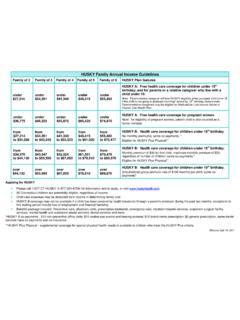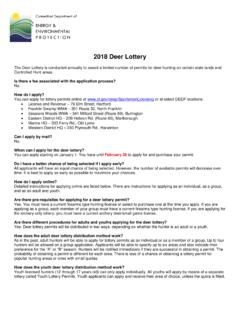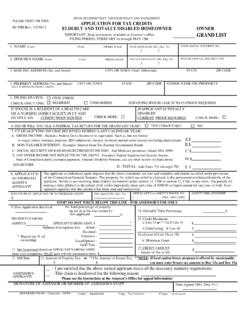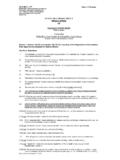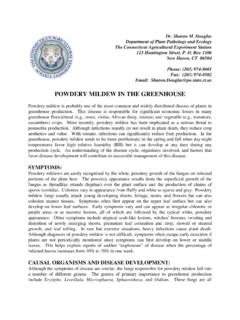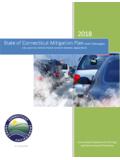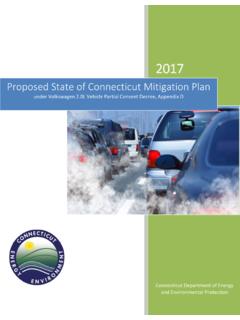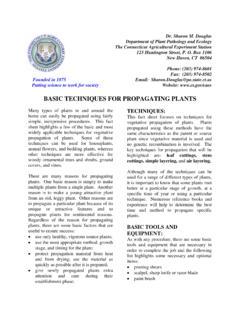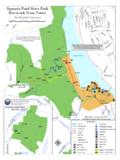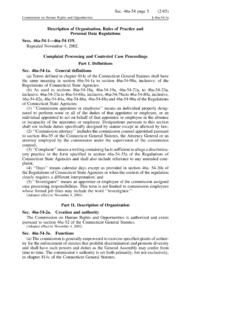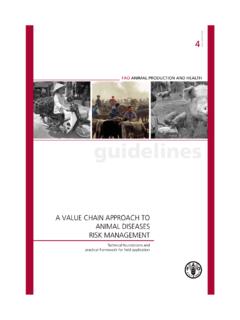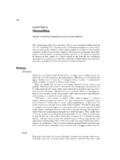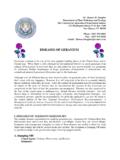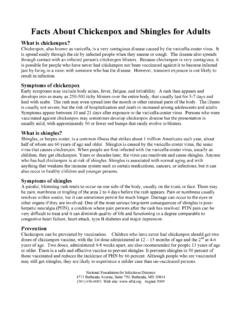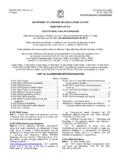Transcription of COMMON DISEASES OF MAPLE - Connecticut
1 Dr. Sharon M. Douglas Department of Plant Pathology and Ecology The Connecticut Agricultural Experiment Station 123 Huntington Street, P. O. Box 1106. New Haven, CT 06504. Phone: (203) 974-8601. Fax: (203) 974-8502. Founded in 1875 Email: Putting science to work for society Website: COMMON DISEASES OF MAPLE . There are a number of DISEASES that occur on often apparent from late spring to early maples throughout Connecticut every year summer but additional cycles of disease can although the severity and distribution of result in damage which is visible later in the these problems vary with each season, each growing season. The range of symptoms site, and each species. DISEASES occur on includes leaf spots, blighted leaves and maples in the landscape as well as those young shoots, cankers, and dieback of growing in natural woodlots and forests. young twigs and branches. The most Anthracnose, fungal leaf spots (including tar COMMON symptoms are large, irregular dead spot), powdery mildew, and Verticillium areas on the leaf that are often V-shaped or wilt are DISEASES that are usually delineated by the veins (Figures 1 and 2).
2 Encountered every year whereas leaf scorch is an occasional problem. The species of MAPLE that we most frequently encounter in the Plant disease Information Office are: Acer palmatum (Japanese MAPLE ), A. platanoides (Norway MAPLE ), A. pseudoplatanus (sycamore MAPLE ), A. rubrum (red or swamp MAPLE ), A. saccharinum (silver MAPLE ), and A. saccharum (sugar MAPLE ). The degree to which each species is affected by disease can be quite variable and is influenced by genetic factors, microclimate, and predisposition by other stresses ( , drought, excess water, winter injury). Figure 1. Typical anthracnose lesions I. ANTHRACNOSE: delineated by the veination pattern of the Causal Agents: Several genera of fungi leaves. ( , Aureobasidium, Discula, Kabatiella). Symptoms: The symptoms associated with These areas can be tan and paper-thin. anthracnose DISEASES vary with the species When infection is severe, the fungus enters of MAPLE and the fungus.
3 Symptoms are the petioles and causes entire leaves to appear blighted, browned, and shriveled. COMMON DISEASES of MAPLE S. M. Douglas 1. The Connecticut Agricultural Experiment Station ( ). These symptoms are often confused with Spores of the fungi are often visible as drought and heat stress since they are very tendrils oozing from the back fruiting similar. Significant leaf drop and premature bodies after periods of wet weather defoliation can occur. Samaras can also (Figure 4). These DISEASES are usually develop necrotic or dead spots and drop more severe on red, sugar, and silver prematurely. MAPLE but can occur on Japanese and Norway MAPLE . Figure 2. Close-up of anthracnose lesion. Management: Refer to management strategies for foliar DISEASES at the end of this section. Figure 3. Septoria leaf spot of MAPLE . Initial symptoms are small necrotic spots, II. LEAF SPOTS and TAR SPOT: which when numerous, can coalesce into Causal Agents: Several genera of fungi: large necrotic areas.
4 Leaf spots ( , Septoria, Phyllosticta, Didymosporina), tar spots (Rhytisma acerinum, R. americanum, and R. punctatum). Symptoms: All species of MAPLE are subject to attack by one or more leaf-spotting fungi. Symptoms usually appear in mid to late summer. Leaf Spots: Symptoms appear as circular to irregular spots approximately to 1 inch in diameter. Some spots have tan to brown centers and distinct purple-brown margins (sometimes referred to as a "frog-eye" symptom) Figure 4. Close-up of tendril of oozing whereas other spots are dark brown and fungal spores (arrow) on abaxial surface of a have diffuse, concentric ring patterns leaf. and irregular margins (Figure 3). Small black fruiting bodies may be visible on Tar Spot: Symptoms first appear as the upper or lower surfaces of the spots. inconspicuous, pale green to yellow COMMON DISEASES of MAPLE S. M. Douglas 2. The Connecticut Agricultural Experiment Station ( ).
5 Areas on the leaves. As the fungus grows within the leaf, these areas III. POWDERY MILDEW: develop into distinctive, slightly raised, Causal Agent: Several genera of fungi shiny, tar-like, black spots on the leaves ( , Erysiphe, Phyllactinia). (Figure 5). The size of the spot depends Symptoms: Leaves develop a somewhat upon the fungal species; spots can be dirty appearance due to the presence of a irregular and up to inch in diameter white to grayish, powdery growth on the (R. acerinum) or can appear as tiny, leaf surface (Figure 7). Symptoms are pinpoint dots (R. punctatum) (Figure 6). usually first evident on the upper surface of Significant premature fall coloration and the leaf and can result in premature fall defoliation can occur, especially when coloration. Unlike many other foliar infection is heavy (as is often the DISEASES , powdery mildew typically situation on Norway MAPLE ).
6 Develops late in the growing season. It can result in defoliation when infection is severe. Figure 5. Tar spot on MAPLE . Figure 7. Diagnostic powdery growth on upper surface of a MAPLE leaf. Management: Refer to management strategies for foliar DISEASES at the end of this section. Management Strategies for Foliar DISEASES : Control of anthracnose, leaf spots, and powdery mildews can be achieved using a multifaceted approach. These DISEASES are often effectively Figure 6. Close-up of the tar-like stroma of controlled by following good sanitary and the fungus, Rhytisma spp. cultural practices and are rarely serious enough to warrant chemical control. Since Management: Refer to management many of these fungi overwinter on fallen strategies for foliar DISEASES at the end of leaves, it is important to rake and remove this section. fallen leaves from the vicinity of the tree in COMMON DISEASES of MAPLE S.
7 M. Douglas 3. The Connecticut Agricultural Experiment Station ( ). autumn. This reduces the number of spores undersized, off-colored leaves. These trees available to infect emerging leaves in spring sometimes produce heavy crops of seeds or or during the following growing season. samaras. A diagnostic characteristic of this Tree vigor should also be maintained by disease is a distinctive olive-brown proper watering, fertilizing, and pruning. streaking, which may be evident in the wood Although foliar DISEASES are usually of symptomatic branches or twigs (Figure considered to be more aesthetic than life- 10). threatening, there are situations where they can be serious and cause permanent damage or even tree death. Newly transplanted trees or trees weakened by stress are particularly sensitive to repeated defoliation. In such cases, chemical control can be beneficial. Among the fungicides registered for homeowner use in Connecticut are thiophanate-methyl, chlorothalonil, and mancozeb.
8 The pesticide label will contain information on dosage rates, application intervals, and safety precautions. Since most of these fungi infect in spring as leaves are unfolding, the first fungicide spray is Figure 8. Japanese MAPLE with acute applied at budbreak. Two or three additional symptoms of Verticillium wilt. sprays are subsequently applied at 7-14 day intervals. Additional applications may also be necessary in unusually wet springs. For anthracnose and leaf spots, once symptoms are visible on the leaves it is too late for chemical control. (The exception to early season infections are the powdery mildews. They usually infect in mid-season so applications of fungicides for control would be applied as soon as symptoms are visible.). IV. VERTICILLIUM WILT: Causal Agent: Verticillium spp. Symptoms: Symptoms of Verticillium wilt first appear as a yellowing or wilting of individual limbs or portions of the canopy Figure 9.
9 MAPLE with a portion of the (often referred to as flagging ) (Figures 8 canopy exhibiting premature fall coloration. and 9). This usually occurs in mid-summer, frequently after periods of hot, dry weather. Infected trees die slowly or suddenly, The fungus enters the roots and grows into depending upon the extent of infection and the water transport system (xylem) of the the overall health of the tree. Trees tree where it restricts the movement of water weakened by drought or root damage are and nutrients within the tree. Infected trees thought to be more prone to disease . often have sparse canopies consisting of COMMON DISEASES of MAPLE S. M. Douglas 4. The Connecticut Agricultural Experiment Station ( ). necrotic or dead margins (Figures 11, 12, and 13). Figure 10..Diagnostic vascular discoloration in sapwood of MAPLE infected Figure 11. Japanese MAPLE leaves with with Verticillium wilt.
10 Marginal scorch symptoms Management Strategies for Verticillium Wilt: There are no satisfactory controls for this disease of MAPLE once trees are infected. However, efforts to maintain tree health and vigor can help to prolong the life of the tree. It is helpful to prune affected limbs as soon as symptoms are evident. This helps to minimize secondary invaders and opportunistic pests. Tools should be disinfested between cuts with a 10%. solution of household bleach or 70%. alcohol. Additional efforts to promote tree vigor by watering, fertilizing (only as Figure 12. Marginal scorch. necessary, based on a soil test) and avoiding other types of stress are helpful. Since the fungus is soil-borne, it is necessary to avoid planting susceptible species in the area. A. list of resistant species can be found in Table 1 at the end of this fact sheet. V. SCORCH: Causal Factors: Drought and heat stress Symptoms: Symptoms usually develop after periods of hot, dry weather in July and Figure 13.
